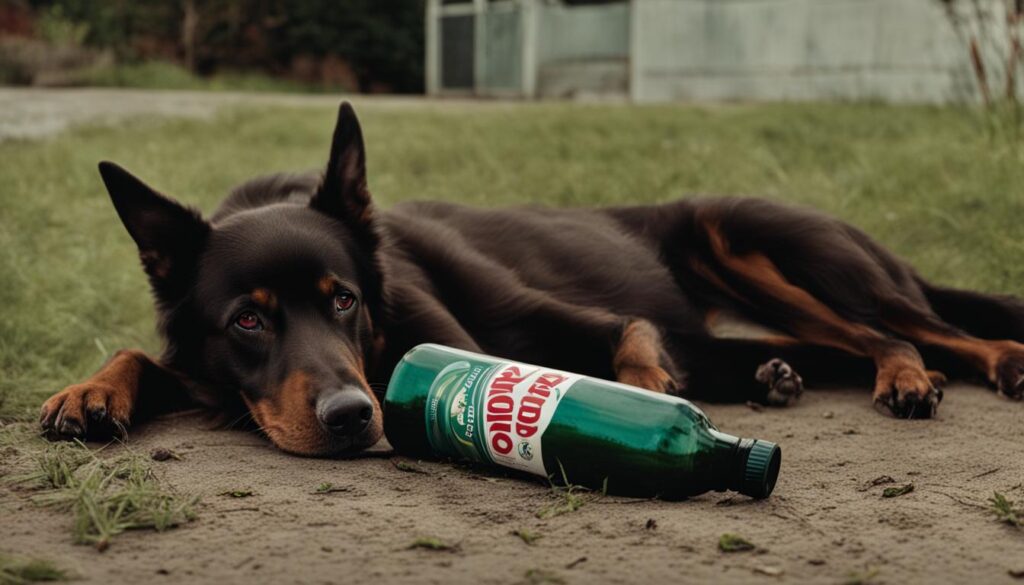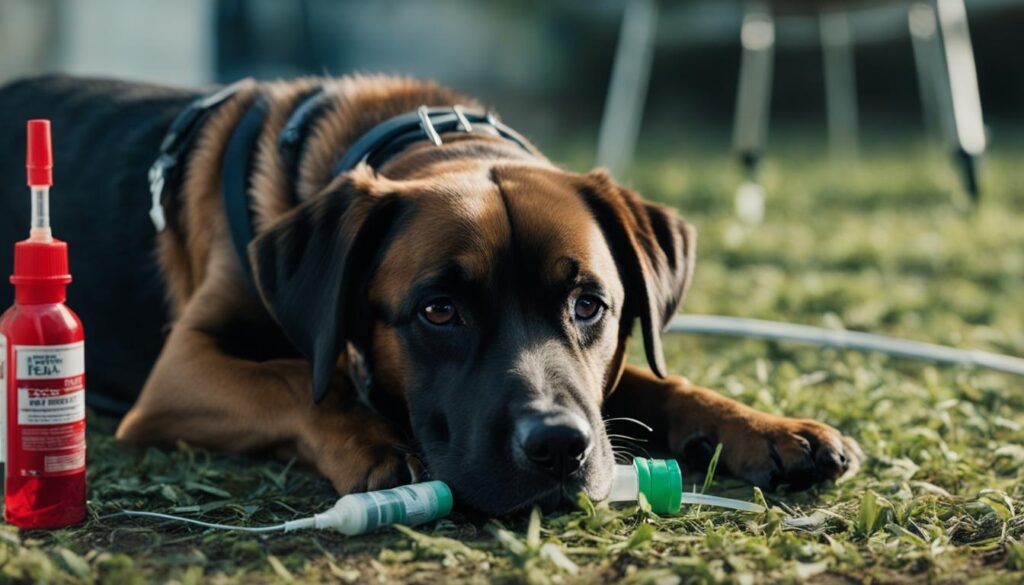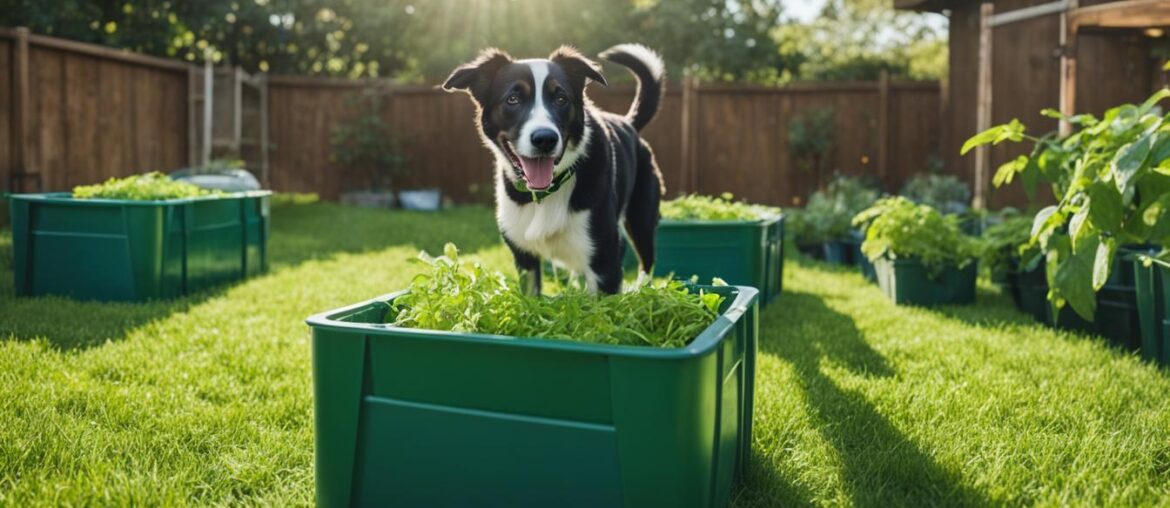Herbicides, including Roundup, are commonly used to manage unwanted plants and weeds. As responsible pet owners, it is important to understand the potential risks these chemicals may pose to our furry friends. In this article, I will provide valuable insights and tips from veterinarians regarding the safety of Roundup for dogs, as well as dog-safe alternatives to consider.
Key Takeaways:
- While most herbicides are safe for dogs when used correctly, some can be toxic if dogs are exposed to large quantities or through improper use.
- Symptoms of herbicide poisoning in dogs can range from gastrointestinal issues to severe neurological and cardiovascular impairment.
- If your dog displays symptoms of herbicide poisoning, it is crucial to seek immediate veterinary care.
- Common herbicide products that can be toxic to dogs include Borax, Sodium chlorate, Bipyridyl compounds, and Glyphosate herbicides like Roundup.
- To prevent herbicide poisoning, store chemicals out of your dog’s reach and consider using dog-safe alternatives to chemical herbicides.
Herbicide Poisoning in Dogs: Symptoms and Treatment
Herbicide poisoning in dogs can have serious consequences and should be addressed promptly. Dogs exposed to herbicides may display a range of symptoms including drooling, vomiting, anorexia, diarrhea, lethargy, weakness, abdominal pain, skin and eye irritation, convulsions, dilated pupils, excessive water intake, ulcers in the mouth and gastrointestinal tract, kidney failure, liver damage, trouble breathing, abnormal gait, elevated or decreased heart rate, collapse, and muscle relaxation issues.
If you suspect your dog has been exposed to herbicides, it is crucial to seek immediate veterinary care. Contact the Pet Poison Control Helpline or your veterinarian for advice and to determine the extent of toxicity. Time is of the essence in treating herbicide poisoning in dogs.
The treatment for herbicide poisoning in dogs may involve various interventions depending on the specific circumstances. If there is contact with the skin, it is important to bathe the dog thoroughly to remove any residue. If there is oral exposure, rinsing the mouth can help minimize further absorption. In some cases, induced vomiting may be necessary. Administering activated charcoal can help reduce the absorption of the herbicide. Intravenous fluids may be given to maintain hydration and flush out the toxins. Medications may also be prescribed to manage symptoms, and the dog will be closely monitored for any signs of organ damage.
Common Herbicide Products
Several herbicide products can be toxic to dogs if ingested or exposed to in significant quantities. It is essential for dog owners to be aware of these common herbicides to prevent accidental poisoning. Some of the common herbicide products toxic to dogs include:
| Herbicide Product | Active Ingredient |
|---|---|
| Borax | Sodium borate |
| Sodium chlorate | Sodium chlorate |
| Bipyridyl compounds | Paraquat, Diquat |
| Glyphosate herbicides (e.g., Roundup) | Glyphosate |
These are just a few examples of the many herbicide products available in the market that can pose a risk to dogs. It is important to read and follow the instructions and safety precautions provided by the manufacturer when using any herbicide product around pets.
In case of herbicide poisoning in dogs or any other pet emergency, it is advised to contact the Poison Control Helpline for Pets at 1-800-222-1222 for immediate assistance.
Note: The table above provides a list of common herbicide products and their active ingredients. It is not an exhaustive or definitive list, and there may be other herbicide products that can be toxic to dogs. Always seek professional advice if you suspect your dog has been exposed to herbicides or any other potentially harmful substances.
Pesticide Poisoning in Dogs: Symptoms and Treatment
Pesticides, including insecticides, herbicides, rodenticides, nematicides, fungicides, and larvicides, are commonly used to control pests and manage unwanted plant growth. However, these substances can pose a significant risk to dogs if ingested or exposed to in excessive amounts.
Common pesticides poisonous to dogs include herbicides like Roundup, insecticides such as Orthrene and Sevin, rodenticides like d-CON and Tomcat baits, nematicides, fungicides, and larvicides. These substances can cause pesticide poisoning in dogs, with symptoms ranging from mild gastrointestinal distress to life-threatening complications.
The symptoms of pesticide poisoning in dogs may include:
- Gastrointestinal distress such as vomiting and diarrhea
- Lethargy and weakness
- Increased heart and respiratory rates
- Hypersalivation
- Muscle tremors and seizures
- Respiratory failure
Prompt veterinary treatment is crucial if you suspect your dog has been exposed to pesticides and is displaying any of these symptoms. The specific treatment for pesticide poisoning will depend on the type of pesticide and the symptoms exhibited. It may involve decontamination measures, such as bathing the dog if there is skin exposure, and rinsing the mouth if there is oral exposure. Veterinary interventions may also include inducing vomiting, administering activated charcoal to reduce absorption, providing intravenous fluids, symptom management medications, and monitoring for organ damage.
Remember, if you notice any signs of pesticide poisoning in your dog, seek immediate veterinary care to ensure the best chances of a full recovery.
Safety Precautions When Using Herbicides and Pesticides around Dogs

To ensure the safety of your beloved dogs when using herbicides and pesticides, it is crucial to follow proper safety precautions. By taking these steps, you can minimize the risk of herbicide and pesticide poisoning in dogs and create a safe environment for your furry friends.
Storing Chemicals Out of Dog’s Reach
The first step in preventing herbicide and pesticide poisoning is to store all weed killer chemicals in a secure location that is inaccessible to your dogs. Keep them in locked cabinets or high shelves to avoid accidental ingestion or exposure.
Caution around Dogs when Using Herbicides
When using herbicides or pesticides, exercise caution around your dogs. Avoid spraying or applying the chemicals in areas where your dogs frequently roam. If possible, consider keeping your dogs indoors or in a separate fenced-off area while applying these products.
Keeping Dogs off Treated Areas
After applying herbicides or pesticides, it is essential to keep your dogs off the treated areas until the product has fully dried. This will reduce the risk of ingestion or skin exposure, as wet chemicals can easily transfer onto your dog’s paws or fur.
Drying of Herbicides to Reduce Toxicity
Allowing the herbicides or pesticides to thoroughly dry after application can help reduce their potential toxicity for dogs. Keep in mind that some chemicals may take longer to dry than others, so it’s important to follow the specific instructions on the product label.
Natural Alternatives to Chemical Herbicides
If you’re concerned about the potential risks associated with chemical herbicides, consider using natural alternatives. There are several dog-safe options available, such as mechanical weed control methods like hand-pulling weeds or using gardening tools, mulching, and spot treatments with vinegar or salt. These alternatives can help maintain a weed-free environment without posing a threat to your dogs.
By following these safety precautions, you can protect your dogs from herbicide and pesticide poisoning. Remember to always read and follow the instructions on the product labels carefully. If you suspect your dog has been exposed to herbicides or pesticides and is displaying symptoms of poisoning, contact your veterinarian immediately for guidance and treatment.
Risks of Roundup to Dogs and Pet Health

Roundup, a glyphosate herbicide, is commonly used for weed control. While Roundup is generally considered safe for dogs when used as directed, it can pose risks if dogs are exposed to large quantities or if exposure is chronic. Roundup toxicity in dogs can lead to organ damage, particularly affecting the liver and kidneys. Prolonged exposure to Roundup or any herbicide can also cause liver or kidney disease in dogs over time. It is important to minimize herbicide exposure and seek veterinary attention if any signs of toxicity or organ damage are observed.
Effects of Roundup Toxicity in Dogs
Exposure to Roundup can have detrimental effects on a dog’s health. The active ingredient, glyphosate, has the potential to cause organ damage, particularly in the liver and kidneys. Persistent exposure to Roundup can lead to chronic liver or kidney disease in dogs, which may require long-term management and veterinary care.
Minimizing Herbicide Exposure
To protect dogs from the risks of Roundup and other herbicides, it is important to take precautions and minimize their exposure:
- Avoid using herbicides in areas where dogs have direct access.
- Keep dogs away from treated areas until the product has dried thoroughly.
- If herbicides are used, consider creating barriers or fencing to prevent accidental exposure.
- Follow the instructions on the herbicide product carefully and use it as directed.
- Consider exploring dog-friendly alternatives to chemical herbicides, such as mechanical weed control or natural weed killers.
Recognizing the Signs of Roundup Toxicity
If a dog has been exposed to Roundup, it is important to be vigilant and watch for any signs of toxicity, including:
- Vomiting
- Diarrhea
- Lethargy
- Loss of appetite
- Increased thirst
- Abdominal pain
If any of these symptoms are observed, it is crucial to seek immediate veterinary care.
By understanding the risks of Roundup to dogs and taking necessary precautions, pet owners can help protect their beloved pets from potential harm and ensure their long-term health and well-being.
Dog-Safe Alternatives to Roundup

When it comes to weed control in your garden, there are dog-safe alternatives to Roundup and other chemical herbicides. These alternatives not only help keep your garden weed-free but also ensure the safety and well-being of your furry friends. Here are some natural weed control methods and organic herbicides that are safe for dogs:
Mechanical Weed Control
One of the most effective ways to control weeds without the use of chemicals is through mechanical methods. This includes hand-pulling weeds, using gardening tools like hoes or trowels to remove weeds from the root, or using a weed trimmer for larger areas. Mechanical weed control is safe for dogs and provides a hands-on approach to weed management.
Mulching
Mulching is another dog-safe alternative to chemical herbicides. By spreading a layer of mulch around your plants and garden beds, you can suppress weed growth and prevent them from taking over. Organic mulch materials such as wood chips, straw, or shredded leaves can be used to create a weed barrier while nourishing the soil.
Vinegar as a Herbicide
Vinegar is a natural herbicide that can be used as a spot treatment for weeds. Its acetic acid content helps to kill unwanted plants by drying them out. However, it’s important to use vinegar carefully and avoid overspraying onto desired plants, as it can also harm them. Diluting vinegar with water and adding a few drops of dish soap can increase its effectiveness.
Salt as a Herbicide
Salt can be used as an organic herbicide to control weeds in areas where vegetation is not desired, such as cracks in sidewalks or driveways. Sprinkling salt directly on weeds can dehydrate and kill them. However, salt should be used sparingly, as excessive amounts can damage the soil and surrounding plants.
Corn Gluten Meal as a Pre-Emergent Herbicide
Corn gluten meal is a natural pre-emergent herbicide that prevents weed seeds from germinating. It acts as a weed suppressant by inhibiting root formation in germinating seeds. Applying corn gluten meal to your garden in early spring can help prevent weed growth without posing any harm to dogs.
By utilizing these dog-safe alternatives to Roundup, you can maintain a weed-free garden while keeping your furry companions safe from harmful chemicals. Remember to always follow the instructions on the product labels and take necessary precautions to ensure the well-being of both your dogs and your plants.
| Safe Weed Killing Options for Dogs | Pros |
|---|---|
| Mechanical Weed Control (Hand-pulling, gardening tools, weed trimmer) | – Provides hands-on approach to weed management – Safe for dogs – Avoids the use of chemicals |
| Mulching | – Suppresses weed growth and prevents weed invasion – Nourishes the soil – Safe for dogs |
| Vinegar as a Herbicide | – Natural and non-toxic – Effective spot treatment for weeds – Caution should be taken to avoid overspraying on desired plants |
| Salt as a Herbicide | – Organic weed control option – Kills weeds by dehydrating them – Should be used sparingly to prevent damage to soil and surrounding plants |
| Corn Gluten Meal as a Pre-Emergent Herbicide | – Prevents weed seeds from germinating – Organic and safe for dogs – Nourishes the soil as it breaks down |
What to Do if Your Dog is Exposed to Roundup?

If your dog is exposed to Roundup or any herbicide, it is important to take immediate action to ensure their safety and well-being. The steps you should take depend on whether your dog has ingested or come into contact with Roundup, and whether they are showing any symptoms of toxicity.
Step 1: Assess the Situation
If your dog has ingested Roundup but is not showing any symptoms, it is advisable to contact the Pet Poison Helpline or your veterinarian for guidance. They will be able to assess the situation and provide specific advice based on your dog’s breed, size, and the amount of Roundup ingested. It is important to provide accurate information about the product, such as the active ingredients and concentration, to help the veterinarian make an informed decision.
Step 2: Watch for Symptoms
If your dog is displaying symptoms of Roundup toxicity, such as vomiting, diarrhea, weakness, or seizures, it is crucial to seek emergency veterinary care immediately. Roundup exposure in dogs can lead to serious health issues, and prompt medical attention is essential for their well-being. Do not attempt to induce vomiting without professional guidance, as it can cause further complications.
Step 3: Take Photos
If possible, take photos of the Roundup bottle or packaging to show the veterinarian. This information can help them understand the specific product and its potential effects on your dog. Providing accurate details about the exposure will aid in their diagnosis and treatment plan.
Step 4: Follow Veterinary Advice
Once you have sought veterinary care, follow the advice and treatment plan provided by the veterinarian. They may perform diagnostic tests, such as bloodwork or urinalysis, to assess your dog’s organ function and determine the appropriate course of action. Treatment for Roundup exposure in dogs may involve supportive care, such as intravenous fluids and medications to manage symptoms or prevent complications.
Remember, the best course of action when your dog is exposed to Roundup or any herbicide is to seek professional veterinary care immediately. Prompt intervention can make a significant difference in your dog’s prognosis and recovery.
| Symptoms of Roundup Exposure in Dogs | Emergency Actions |
|---|---|
| Vomiting, diarrhea, weakness | Seek emergency veterinary care |
| Seizures, difficulty breathing | Seek emergency veterinary care |
| Unconsciousness or collapse | Seek emergency veterinary care |
| No symptoms, recent ingestion or exposure | Contact Pet Poison Helpline or your veterinarian for guidance |
Prevention and Safety Tips for Using Herbicides and Pesticides Around Dogs

When it comes to using herbicides and pesticides around our beloved canine companions, their safety should always be a top priority. Here are some essential prevention and safety tips to ensure the well-being of our dogs:
Safe Use of Herbicides and Pesticides
- Follow the product instructions carefully and use herbicides and pesticides in accordance with the recommended dosage.
- Choose dog-safe herbicides and pesticides that have a wide safety margin for pets.
- Consider natural weed control methods as alternatives to chemical herbicides.
Proper Storage of Herbicides and Pesticides
- Store herbicides and pesticides securely in a locked cabinet or storage area that is inaccessible to dogs.
- Avoid storing these chemicals in areas where dogs can easily reach or knock over containers.
Avoiding Skin and Eye Exposure in Dogs
When using herbicides and pesticides, take precautions to prevent skin and eye exposure in dogs:
- Wear gloves, long sleeves, and protective eyewear when handling these chemicals.
- Keep dogs away from treated areas until the product has dried thoroughly.
Cleaning Dog’s Paws and Legs after Herbicide Exposure
If a dog accidentally comes into contact with herbicides or pesticides, it is important to clean their paws and legs to remove any residue:
- Use mild soap and water to gently wash the affected areas.
- Rinse thoroughly to ensure all residue is removed.
Keeping Dogs Away from Treated Grass
To minimize the risk of exposure, it is recommended to keep dogs away from areas where herbicides and pesticides have been applied:
- Use physical barriers or temporary fencing to restrict access to treated grass or gardens.
- Train dogs to stay away from treated areas and provide alternative play and exercise spaces.
By following these prevention and safety tips, we can create a dog-friendly environment while effectively managing weeds and pests. Prioritizing the well-being of our furry friends is essential when using herbicides and pesticides.
The Importance of Immediate Veterinary Care for Herbicide and Pesticide Poisoning

When a dog is exposed to herbicides or pesticides and shows symptoms of poisoning, timely veterinary care is essential. Immediate treatment can be life-saving and help prevent further complications. The veterinarian, with their expertise and professional guidance, can assess the extent of toxicity and provide appropriate care.
Upon arrival at the veterinary clinic, the first step may involve decontamination to minimize further absorption of the toxic substance. This could include bathing the dog if there was skin contact or rinsing the mouth if there was oral exposure. The veterinarian may administer activated charcoal, which helps bind the toxin in the gastrointestinal tract, minimizing its absorption into the bloodstream.
Intravenous fluids may be administered to maintain hydration and flush out the toxin from the body. Medications can be prescribed to manage specific symptoms, such as antiemetics to control vomiting or anticonvulsants to prevent seizures. The dog will be carefully monitored for any signs of organ damage or complications.
The prognosis for herbicide and pesticide poisoning depends on various factors, including the specific substance ingested, the dosage, and the timeliness of treatment. Immediate veterinary care increases the chances of a positive outcome and reduces the risk of long-term effects. Prolonged exposure or delayed treatment can lead to severe organ damage, requiring ongoing management and potential long-term health issues for the dog.
It’s important to note that different herbicides and pesticides may pose varying levels of risk to dogs. The veterinarian will provide detailed information about the specific substance involved and any potential long-term effects. They can offer guidance on monitoring the dog’s health and taking preventive measures to minimize the risk of future exposure.
If you suspect your dog has been exposed to herbicides or pesticides and is showing symptoms of poisoning, do not hesitate to seek immediate veterinary care. Time is of the essence when it comes to managing poisoning cases, and the expertise and prompt intervention of a veterinarian are paramount to your dog’s well-being and recovery.
Prognosis and Long-Term Effects of Poisoning
The prognosis for herbicide and pesticide poisoning can vary depending on the specific substance and the severity of the exposure. While immediate veterinary care significantly improves the chances of recovery, long-term effects can still occur, especially if the poisoning led to organ damage.
In cases where the poisoning has caused irreversible damage to the liver, kidneys, or other vital organs, lifelong management and monitoring may be necessary. Dogs with compromised liver function may require dietary modifications and medication to support liver health. Kidney damage may necessitate specialized diets, fluid therapy, and ongoing monitoring of kidney function.
Regular check-ups with the veterinarian are crucial to detect and address any potential long-term effects and ensure the dog’s overall health and well-being. By providing timely treatment and diligent care, pet owners can help minimize the impact of herbicide and pesticide poisoning and provide their dogs with the best possible quality of life.
Wrapping Up
After exploring the topic of Roundup safety for dogs and the risks associated with herbicide and pesticide exposure, it is clear that precautions must be taken to protect our furry friends. While Roundup and most herbicides are generally safe when used as directed, there is still a potential for toxicity if dogs are exposed to large quantities or if exposure is chronic.
To create a dog-safe garden environment, it is important to follow herbicide and pesticide safety precautions. This includes storing chemicals out of a dog’s reach, exercising caution during use to avoid skin and eye exposure, and exploring dog-friendly alternatives to chemical herbicides. By utilizing natural weed control methods such as mechanical weed removal, mulching, and spot treatments with vinegar or salt, we can minimize the risks to our dogs’ health.
In the event that a dog is exposed to herbicides or pesticides and displays symptoms of poisoning, immediate veterinary care is crucial. Prompt diagnosis and treatment can help mitigate the potential damage and improve the prognosis. Remember, timely action can make a significant difference in safeguarding our dogs’ well-being.
By following these recommendations and seeking professional guidance when needed, we can ensure a dog-safe garden while maintaining a beautiful and weed-free outdoor space. Let’s prioritize the health and safety of our beloved dogs as we create a harmonious environment for both our pets and plants.
FAQ
Is Roundup safe for dogs?
While Roundup is generally considered safe for dogs when used as directed, it can pose risks if dogs are exposed to large quantities or if exposure is chronic.
What are the symptoms of herbicide poisoning in dogs?
Symptoms of herbicide poisoning in dogs can include drooling, vomiting, anorexia, diarrhea, lethargy, weakness, abdominal pain, skin and eye irritation, convulsions, dilated pupils, excessive water intake, ulcers in the mouth and gastrointestinal tract, kidney failure, liver damage, trouble breathing, abnormal gait, elevated or decreased heart rate, collapse, and muscle relaxation issues.
How is herbicide poisoning in dogs treated?
Treatment for herbicide poisoning in dogs may involve bathing the dog if there is skin contact, rinsing the mouth if there is oral exposure, induced vomiting, administration of activated charcoal to minimize absorption, IV fluids, medications for symptoms, and monitoring for organ damage.
What are common herbicide products that can be toxic to dogs?
Common herbicide products that can be toxic to dogs include Borax, Sodium chlorate, Bipyridyl compounds, Glyphosate herbicides like Roundup, and more.
What are the symptoms of pesticide poisoning in dogs?
Symptoms of pesticide poisoning in dogs can include gastrointestinal distress, lethargy, weakness, vomiting, diarrhea, increased heart and respiratory rates, hypersalivation, muscle tremors, seizures, and respiratory failure.
How is pesticide poisoning in dogs treated?
Prompt veterinary treatment is necessary for pesticide poisoning in dogs, and specific treatment will depend on the type of pesticide and its symptoms.
What safety precautions should I take when using herbicides and pesticides around dogs?
To ensure safety, store all weed killer chemicals out of a dog’s reach, exercise caution to prevent skin and eye exposure, and consider using natural alternatives to chemical herbicides. Keep dogs off treated areas until the product has thoroughly dried.
Are there dog-safe alternatives to Roundup?
Yes, there are several dog-safe alternatives to Roundup, including mechanical weed control methods, mulching, natural herbicides like vinegar and salt, and using corn gluten meal as a pre-emergent herbicide.
What should I do if my dog is exposed to Roundup?
If your dog is exposed to Roundup, contact the Pet Poison Helpline or your veterinarian for guidance. If your dog is displaying symptoms of toxicity, seek emergency veterinary care immediately.
How can I prevent herbicide and pesticide poisoning in dogs?
Store chemicals out of a dog’s reach, follow safety precautions during use, consider natural alternatives to chemical herbicides, and keep dogs away from treated areas until the product is completely dry.
Why is immediate veterinary care important for herbicide and pesticide poisoning?
Immediate veterinary care is crucial for timely diagnosis and treatment of herbicide and pesticide poisoning in dogs. Professional guidance can help minimize the impact of poisoning and ensure the best prognosis.






